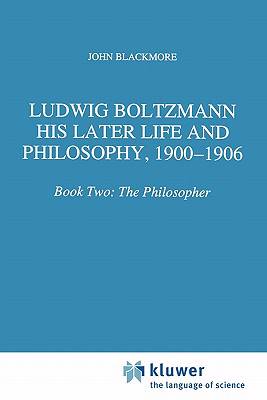
- Afhalen na 1 uur in een winkel met voorraad
- Gratis thuislevering in België vanaf € 30
- Ruim aanbod met 7 miljoen producten
- Afhalen na 1 uur in een winkel met voorraad
- Gratis thuislevering in België vanaf € 30
- Ruim aanbod met 7 miljoen producten
Zoeken
€ 305,45
+ 610 punten
Uitvoering
Omschrijving
After his failure to replace metaphysics by a linguistic approach, Ludwig Boltzmann came to identify the philosophy of science with methodology which, in turn, he considered to be part of science itself, and thus not part of philosophy at all. His definition of philosophy as metaphysics meant that, from his point of view, all philosophers were metaphysicians, himself included.
Boltzmann the philosopher was advised on the improvement of his Weltanschauung by Franz Brentano; to such effect that, by the summer of 1905, Boltzmann appeared to be close to a form of critical realism. However, the stronger this realism became, the more inconsistent it seemed to be with his `Mach plus pictures' methodology of science. During this period, he planned to write a book, first on metaphysics and then later on what he called `A priori probability' and what he considered to be its shortcomings. Apparently, the book was never completed.
All know Boltzmann the great physicist. Much less widely known is that he was an original philosopher: one who had a great impact on early 20th Century Viennese philosophy, beginning with Wittgenstein and the Vienna Circle and extending even to Popper and Feyerabend. Blackmore's delving into Boltzmann's correspondence, coupled with his unparalleled knowledge of Boltzmann's final years, allows him to present Boltzmann in an entirely new light to readers in the English language.
For physicists, philosophers and historians.
Boltzmann the philosopher was advised on the improvement of his Weltanschauung by Franz Brentano; to such effect that, by the summer of 1905, Boltzmann appeared to be close to a form of critical realism. However, the stronger this realism became, the more inconsistent it seemed to be with his `Mach plus pictures' methodology of science. During this period, he planned to write a book, first on metaphysics and then later on what he called `A priori probability' and what he considered to be its shortcomings. Apparently, the book was never completed.
All know Boltzmann the great physicist. Much less widely known is that he was an original philosopher: one who had a great impact on early 20th Century Viennese philosophy, beginning with Wittgenstein and the Vienna Circle and extending even to Popper and Feyerabend. Blackmore's delving into Boltzmann's correspondence, coupled with his unparalleled knowledge of Boltzmann's final years, allows him to present Boltzmann in an entirely new light to readers in the English language.
For physicists, philosophers and historians.
Specificaties
Betrokkenen
- Auteur(s):
- Uitgeverij:
Inhoud
- Aantal bladzijden:
- 320
- Taal:
- Engels
- Reeks:
- Reeksnummer:
- nr. 174
Eigenschappen
- Productcode (EAN):
- 9789048145478
- Verschijningsdatum:
- 4/12/2010
- Uitvoering:
- Paperback
- Formaat:
- Trade paperback (VS)
- Afmetingen:
- 156 mm x 234 mm
- Gewicht:
- 476 g

Alleen bij Standaard Boekhandel
+ 610 punten op je klantenkaart van Standaard Boekhandel
Beoordelingen
We publiceren alleen reviews die voldoen aan de voorwaarden voor reviews. Bekijk onze voorwaarden voor reviews.








